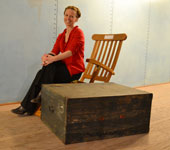They were robbed on the ship to Canada and quarantined when they arrived at Pier 21, but the Haddad family still felt blessed.
The Christian Palestinian refugees had already fled to Lebanon, then Syria, then Lebanon again.
While Laima Haddad still hoped to return to her home one day, her family decided to come to Canada in June 1955.
“…one was in Montreal, and the others were here in Ottawa. So they convinced my in-laws, they all came before us. A few years before us. And, of course, he wanted to be with his family, so that’s why I have time to be convinced to come to Ottawa,” recalled Laima.
“It came to the stage where he told me, “Okay, you stay, you stay here with the girls and I’ll go and send you money, and I’ll be back when I make my millions." He thinks he was going to come and shovel the dollars. And I didn’t want to be separated like that. Neither my mother wouldn’t let me either. She said that’s not the right way to do it. So anyway, that’s how we decided to come to Canada.”
The family travelled to Cyprus and there was an obstacle because Laima was pregnant with her third child and the authorities didn’t want her to travel but she still would not let her family be separated. She won the day.
Still, another serious challenge was to come as they were crossing the sea on the Olympia.
“…a person or persons went in when we were all sleeping, they stole all the jewelry, they stole all the cash we had. I had no money at all left. How they went in his pajama pockets and took the money, he didn’t feel a thing,” recalls Laima.
“I was on the other side with the kids and he was on one side of the room. And they opened the cupboard and took all of the jewelry that I had—as if somebody was watching us, you know? And the reason we find out is after we woke up, he went—you know to feel the money—he said, "Laima, we were robbed." I said, "What do you mean we were robbed? You had the money in your pockets." He said, "There is no money, no nothing." So we couldn’t even buy a drink on board. So that’s how when we landed, he had, we were put in quarantine.”
While the staff did their best to help the detainees, the Accommodation and Detention quarters at Pier 21 did not make a very good impression.
Laima’s daughter Betty recalls saying "Mom, the windows are so high! I hate being here, let’s go out!"
“…it was green, institutional green,” Betty remembered. “And you looked up and you saw the bars on the windows, and you felt like you’d never get out of there because you couldn’t reach the window, come hell or high water, and the door was locked. So it was just a very frightening thing for a seven-year-old.”
They were two very long days for the Haddad family but when their relatives in Ottawa wired money and copies of medical papers they were released and off to start their new lives.
“…that’s the way it was. And we wouldn’t have it any other way,” Betty recalled. “We paid the price, but as far as we’re concerned, look at the alternative…Our children are blessed and we are blessed, because we’re very close.”
Close, a word that isn’t always used as a positive right now but it is what we all want, a close family. Thanks for the beautiful reminder Betty.
Canadian Museum of Immigration at Pier 21 (08.08.09LH)
